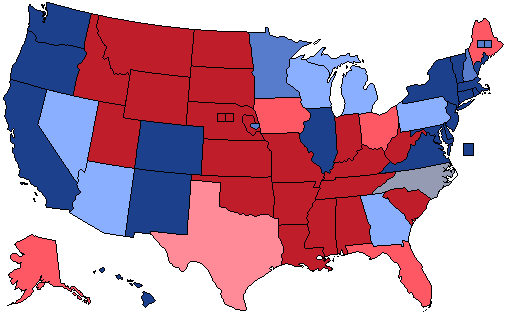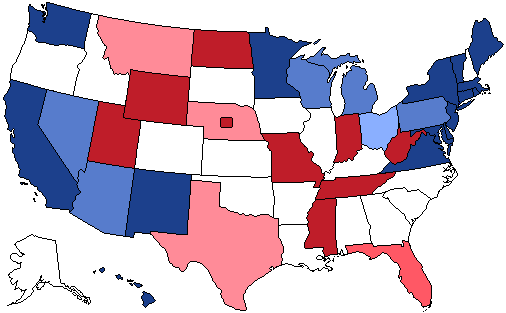Final Election Predictions - November 4th, 2024.
Introduction
This post is also readable on my Substack, "Keystone Politics with Astronomical"
What a year it has been. Apologies for not posting further predictions. Life got busy.
I won’t bore you with a rehash of everything we’ve been through. It’s been a roller coaster of a ride, and I think there are better writes who can give you all the details.
Let’s cut to the chase: I think Kamala Harris is favored to win the Presidential Election, and we’ll most likely end up with a Republican Senate, Democratic House, and a net gain of 1 seat for Democrats in the Gubernatorial election.
Presidential Election
Presidentially, I expect a larger-than-2020, but still a narrow win for Kamala Harris in the gubernatorial campaign. Keep in mind all of the light-blue states are within the margin of error. Trump only needs to win North Carolina and around 3 of the light blue states. Easy? Not necessarily. Doable? Yes.
I also should preface that much of my predictions center around the idea that the polls are going to be ever so slightly off in favor of the Democrats. In short: I think much of the public polling has become victims of “herding” (where they only release the results when they’re super close), in addition to solving the problems that plagued polling the last two cycles. None of the normal pollsters, such as national ones like CNN or FOX want to show Harris in a lead. The industry is afraid of overestimating her odds, and would rather raise Trump’s odds than Harris’. In addition, much of the high quality polls show Harris in a good position, outperforming Biden in much-needed states like Pennsylvania (such as Muhlenberg with Harris +2).
For a lot of people, it’s hard to turn down the noise this late into the game. People will see slop polls from “AtlasIntel”, “Wick”, and “PatriotPolling” and just add them to the averages. That’s how we get results like the ones we see now. In addition with a close race, I also think that strong Democratic ground-game, along with Republican missteps such as leaving much of the GOTV effort to Elon Musk will have then falling short in the swing states.
Harris is the favorite here, but Trump still has paths to victory. I think his most likely route is a sweep of the sunbelt battlegrounds - Arizona, Georgia, North Carolina, and Nevada - before picking off one of the rust belt states. But I think that’s not so likely to happen.

My final prediction is that Kamala Harris will win 319 electoral votes to Donald Trump's 219.
| Rating | Harris | Trump |
|---|---|---|
| Solid | 215 Electoral Votes (including Maine's 1st Congressional District) | 122 Electoral Votes |
| Likely | 17 Electoral Votes (Minnesota, New Hampshire, Maine at Large, Nebraska's 2nd Congressional District) | 57 Electoral Votes (Florida, Iowa, Ohio, Alaska, and Maine's 2nd District) |
| Lean | 77 Electoral Votes (Wisconsin, Michigan, Pennsylvania, Nevada, Arizona, Georgia | 40 Electoral Votes (Texas) |
| Tilt | 16 Electoral Votes (North Carolina) | 0 Electoral Votes |
Senate
Structurally, Republicans have an advantage going into the night, and as such I expect they’ll make a net pick-up of two seats, handing them a 51-49 majority. Of course, many swing states have seats up for play - such as Arizona, Nevada, Michigan, Wisconsin, and Pennsylvania, but I doubt that the party will make much breakthrough in these states, and I imagine incumbents like Casey, Baldwin, and Rosen will outrun Harris in their respective states.
It’s very interesting, because we could be sitting here in a vastly different world talking about a net pickup of 7 seats for the Republicans - maybe even 8 or 9 if we were wish casting. But the decision to run low-quality, unappealing candidates like Kari Lake, Hung Cao, Dave McCormick, and Eric Hovde have made what were already uphill battles even more difficult.
Republican odds are very high here, but just like I said about Trump and the Presidential race early, depending on how the night goes, don’t count Democrats out of Senate control. The races to watch for ways Democrats could make up the deficit are the Republican-held seats of Texas and Nebraska, along with the Democratic-held seat of Montana, where I have Jon Tester, the incumbent, favored to lose to Tim Sheehy. Sheehy has led by around 5% since the summer or so, but more recent polls indicate a tighter race. Texas is an interesting one - I have incumbent Ted Cruz favored at the moment, but his lead has been slim - even slimmer than Trump’s margin in the state. A slightly better-than-expected night for Democrats could easily see Cruz go down, and with it, the chance for Republicans to retake a majority in this chamber. Finally, Nebraska. Dan Osborn is an independent running against incumbent Republican Deb Fisher. Polling for this race has been rather weak, but the New York Times/Siena poll shows Osborn in a really good position to pull off something very interesting in the state. Keep an eye out for this one.

My final prediction is that Republicans will win 51 Senate seats to Democrat's 49 seats, a net gain of 2 for the party.
| Rating | Democrats (Plus Independents in VT and ME) | Republicans |
|---|---|---|
| Seats Not Up | 28 Seats | 38 Seats |
| Solid | 15 Seats | 9 Seats (West Virginia) |
| Likely | 5 Seats (Wisconsin, Michigan, Pennsylvania, Nevada, Arizona) | 1 Seat (Florida) |
| Lean | 1 Seats (Ohio) | 3 Seats (Texas, Montana, Nebraska) |
| Tilt | 0 Seats | 0 Seats |
House Of Representatives
The two years since Republicans managed to clinch only a narrow majority in the House of Representatives feels like forever ago. We’ve gone through two Speakers, around 20 ballots, and close to zero policy wins for the opposition party. Ouch.
With redistricting in Alabama and Louisiana, along with struggling GOP incumbents in California and New York, I have Democrats as favored to take back control of this chamber of Congress. The final seat count here is 226 for the Democrats, and 209 for the Republicans. This is in total a net gain of 13 seats for the Democrats (16 seats flipped red-to-blue, minus 3 flipping blue-to-red). Here’s a zoomable map made with YAPMS if you want more details (darker colors are the seats I expect to flip towards said side).
My map is rather small, but you’ll notice that I don’t have any incumbent Democrats seats flipping, save for the seats lost to a gerrymander by North Carolina Republicans (they all chose to retire, arguing that running under such maps would legitimize them). I admit this is rather bullish of me, and if any other seats are to flip in the GOP column, my first guess would be either Washington’s 3rd District with Marie Gluesenkamp Perez, or Michigan’s 7th district, an open seat where the Democratic candidate, Curtis Hertel Jr. seems to be struggling.
Do keep in mind that seat-by-seat predictions are my least confident ones: House races have much less data available, and there are often really specific aspects and issues to each. The ballpark here is +- 7 for each side.

My final prediction is that Democrats will win 226 House seats to Republican's 207, plus or minus 7.
| Rating | Democrats | Republicans |
|---|---|---|
| Solid | 175 Seats | 180 Seats |
| Likely | 20 Seats | 17 Seats |
| Lean | 28 Seats | 12 Seats |
| Tilt | 3 Seats | 0 Seats |
Gubernatorial
With only 11 seats up for grabs this year - most of them uncompetitive, there isn’t much I can say here. The consensus now is that North Carolina’s Gubernatorial race is Solidly Democratic. That’s probably good for Democratic odds at-large in the state, but it’s unlikely there will be “reverse coattails” or anything. Indiana’s Gubernatorial race is Likely R instead of Safe R. Why? Well, the data we have shows Mike Braun is underperforming. Not enough to lose, but still. (For context, this is the guy who said he’d be cool with banning interracial marriage).
New Hampshire’s Gubernatorial race is Lean D here, which is a shift away from the Republicans, and in my view, the only competitive gubernatorial race here. A lot of polls show Republican Kelly Ayotte narrowly with the edge, but I think that with Harris doing strongly at the top of the ticket, along with the abortion topic, Democrat Joyce Craig will be able to narrowly pull off a victory here.

My final prediction is that Republicans will have 26 Governors Mansions to Democrat's 24.
| Rating | Democrats | Republicans |
|---|---|---|
| Seats Not Up | 20 Seats | 19 Seats |
| Solid | 3 Seats (Including North Carolina) | 7 Seats |
| Likely | 0 Seats | 0 Seats |
| Lean | 1 Seats (New Hampshire) | 0 Seats |
| Tilt | 0 Seats | 0 Seats |
Conclusion
Well, for starters: make sure to vote tomorrow! It’s really important.
What’s interesting about this prediction is that Harris would be the first Democratic President since Grover Cleveland to not enter into office with a fully Democratic Congress. This probably stifles her agenda to a degree. It’s also uncommon for…
- Chambers of Congress to flip during Presidential elections. The last time it happened in the Senate was 2020, and before that was 1980. For the House, it was 1952 when Eisenhower swept in Republican control of Congress
- For the Republicans to Control the Senate and Democrats to Control the House under a Democratic President (The last time was also when Cleveland first entered office)
- Both chambers of Congress to flip simultaneously, in opposite directions (This has never happened! The closest was during the 1882 elections - Democrats had gained the House, and Republicans had regained the Senate after a tie had forced them to agree to share power in the chamber, though it was Republican before the tie had been formed.)
Whatever happens: we’re living through history. Tensions are obviously high, and I think it’s fair to be somewhat nervous. But we’re almost towards the end. Godspeed.
- ItsAstronomical
 ItsAstronomical
ItsAstronomical